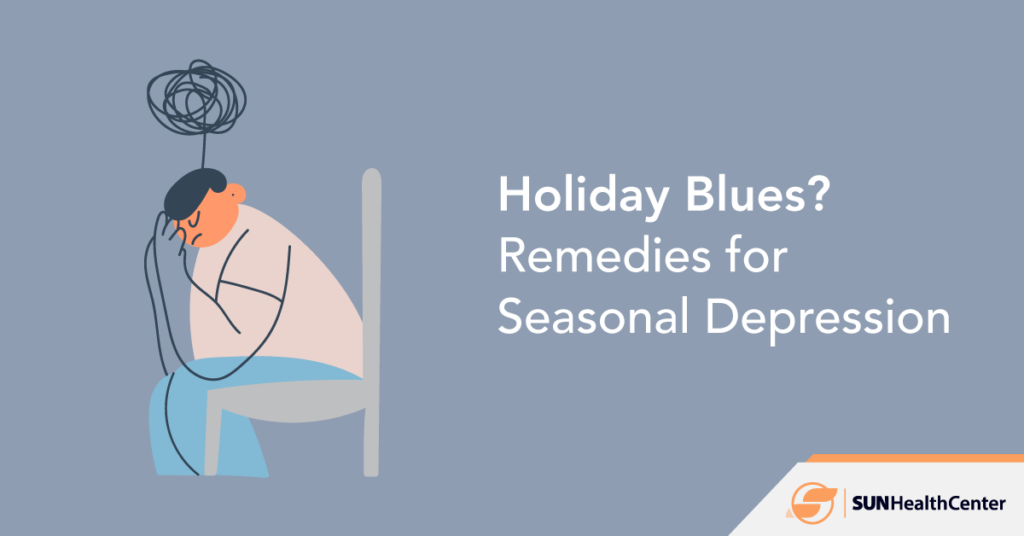
The winter months can lead to feelings of depression for a variety of reasons, and those blues can be especially apparent during the holidays. Read on to learn what seasonal depression is, what might cause it and how you can combat it for a healthier holiday.
What Is Seasonal Depression?
Seasonal depression can refer to feelings of depression that are triggered or connected with certain seasons, including the winter holidays. Seasonal affective disorder, or SAD, is a specific type of depression that may be triggered when seasons change. It’s most common for people to experience SAD starting in the fall, and the symptoms may worsen through the winter.
What Are Some Common Triggers for Holiday-Related Depression?
According to the American Psychological Association, almost 90% of adults in the United States say they experience stress during the holidays. That stress can carry over throughout the winter months. Here are some common triggers for depression around the holidays:
- Social isolation. If you’re unable to travel to visit family during the holidays, don’t have loved ones to celebrate with or feel everyone is celebrating without you, it can trigger feelings of social isolation that cause depression.
- Grief. Many people feel the loss of a loved one deeply during the holidays, particularly if they’re celebrating for the first time without that person or the person passed away around the holidays.
- Unrealistic expectations. Trying to make holiday celebrations live up to perfect expectations can lead to disappointments that cause people to feel guilty, frustrated and depressed.
- Financial burdens. Stress about covering the costs of celebrations, gifts and other holiday trappings can cause people to feel anxiety and depression, and this can last into the New Year as people struggle to recover from holiday spending.
- Seasonal affective disorder. SAD depression may occur due to the changing seasons and other factors that aren’t obvious to an individual.
- Family tensions and stress. Tensions around the holiday table or stress about living up to family expectations or dealing with difficult dynamics can also cause holiday-related depression.
- Changes in diet and routine. Nutrition plays a critical part in mental wellness, but many people forego healthy foods for treats throughout the holiday season. This can leave bodies lacking proper energy, leading to potential fatigue and depression.
- Reduced exposure to sunlight. Shorter days and longer nights can lead to depression for several reasons, including less exposure to sunlight and vitamin D.
Tips for Battling Back Holiday-Related Depression
Taking a proactive approach to your mental health before and during the holidays can help you deal with depression.
1. Engage in Regular Self-Care
Start cultivating good winter self-care habits around October to ensure they’re fully ingrained come December. Depending on your preferences and needs, you might want to include:
- Light therapy to help reduce the impact of lost sunlight on your mood and overall health
- Exercise to help improve your mood and physical fitness
- Healthy routines, such as sleep schedules, healthy eating and self-reflection
2. Stay Connected to Others When Possible
Avoid isolating, even if the holidays are difficult for you. Seek out ways to connect with loved ones and friends in ways that support your needs and help you stay mentally healthy during the holidays.
Not everyone loves loud, sparkling parties, and if you’re recovering from addiction, this may be a scene you want to avoid to cut down on triggers. It’s okay to make choices to avoid some of the traditional trimmings and trappings of holiday seasons, but consider how you can replace them with other traditions. You might ask a loved one to join you for fancy seasonal coffees or do some individual and quiet gift exchanges on Christmas Day, for example.
3. Set Realistic Expectations and Practice Gratitude
On the other hand, if you have high expectations and adore everything the holidays have to offer, you might want to take a moment to set some realistic expectations. Maybe you don’t need to spend 3 days decking your halls like something out of a home decor magazine, for instance. Your family doesn’t have to do everything they’ve done in the past simply because it’s tradition, and not everyone has to attend your holiday party.
Practice gratitude for what you do have and what does work in the holiday season, and let other things go without dwelling on them or stressing.
4. Manage Finances Responsibly
Reduce holiday stress and avoid post-holiday blues by managing money responsibly during the season. Set a budget going into the season, and do your best to avoid impulse shopping. Remind yourself that the love and respect of friends and family aren’t bought with seasonal gifts, and you can have as much fun with each other without thousands of dollars of gifts and decor.
5. Be Honest With Friends and Loved Ones
Let trusted loved ones know when you’re struggling with something during the holidays, and allow them to support you. For example, if you’re grieving the loss of someone, let people know so they understand why you might be quieter than normal. Caring loved ones usually honor your feelings and can find ways to include you in celebrations while also supporting your needs during the holiday.
6. Know When to Seek Professional Support
While holiday depression is somewhat common and you can use many of the tips above to combat seasonal depression, it’s not always something you can handle on your own. If you feel overwhelmed with sadness or grief, don’t think you can face the holidays or don’t get any relief from the tips above, it may be time to seek professional support.
Connect with the team at Sun Health Center in Deerfield Beach, Florida. Our caring professionals will listen to your struggle and provide practical steps to help you get started with treatment.
